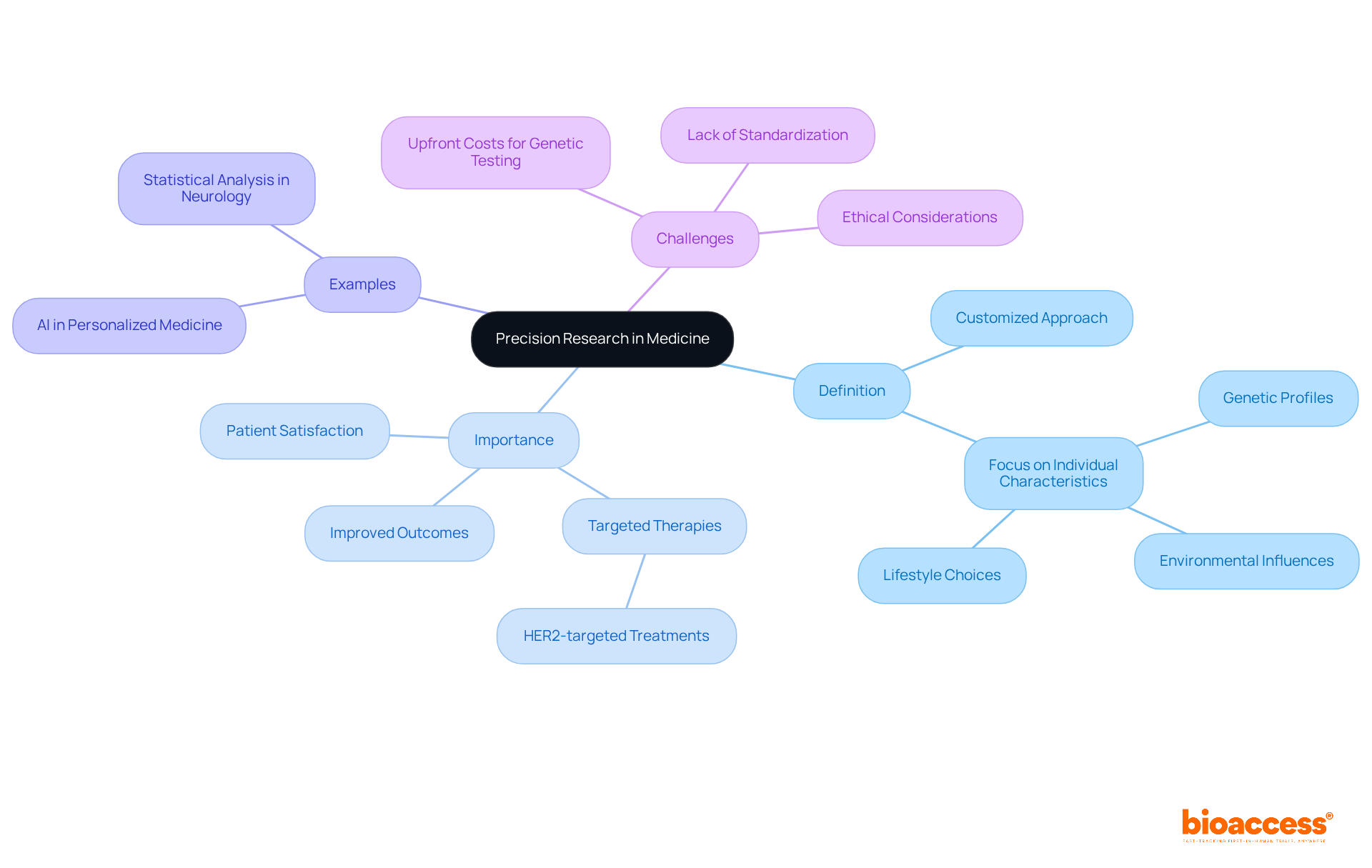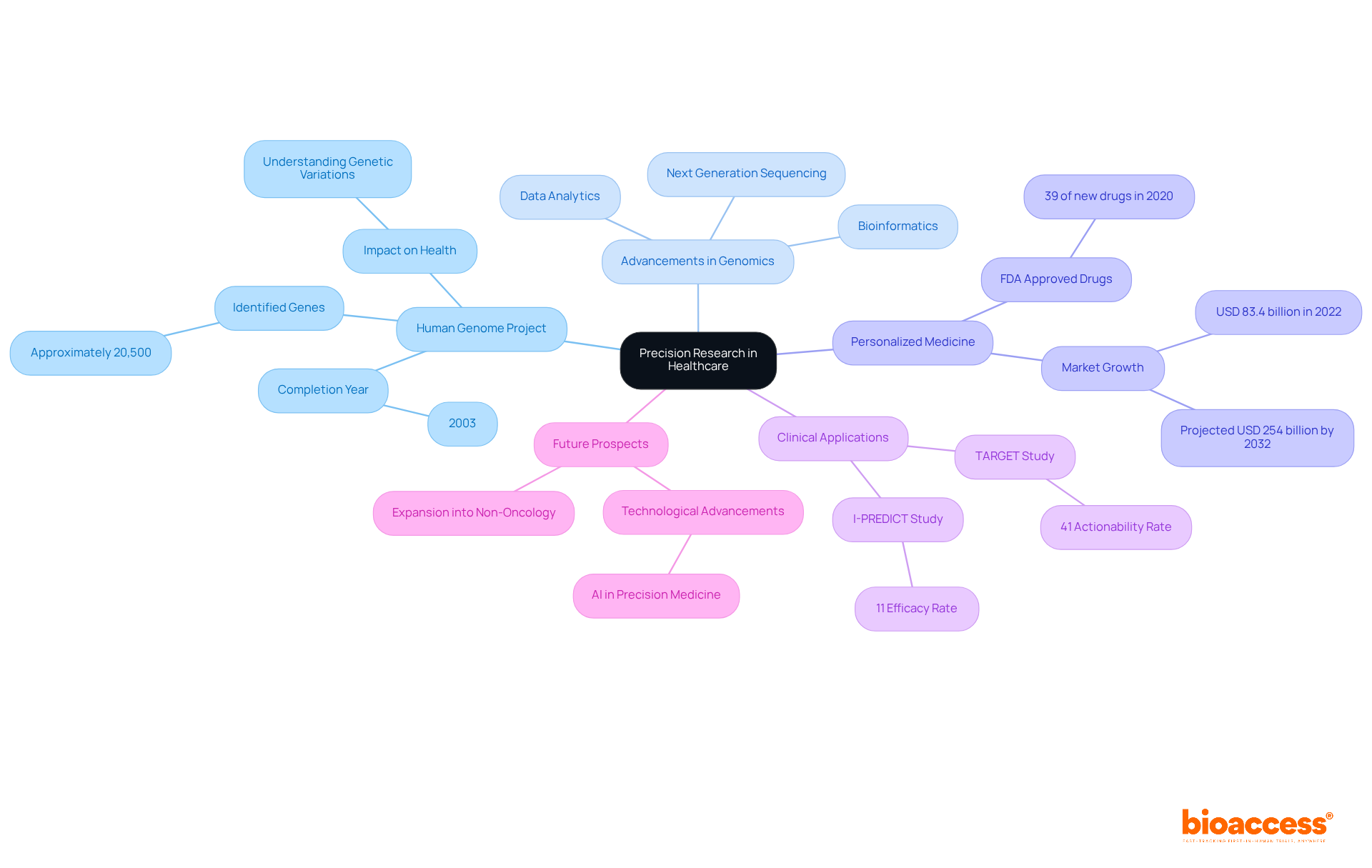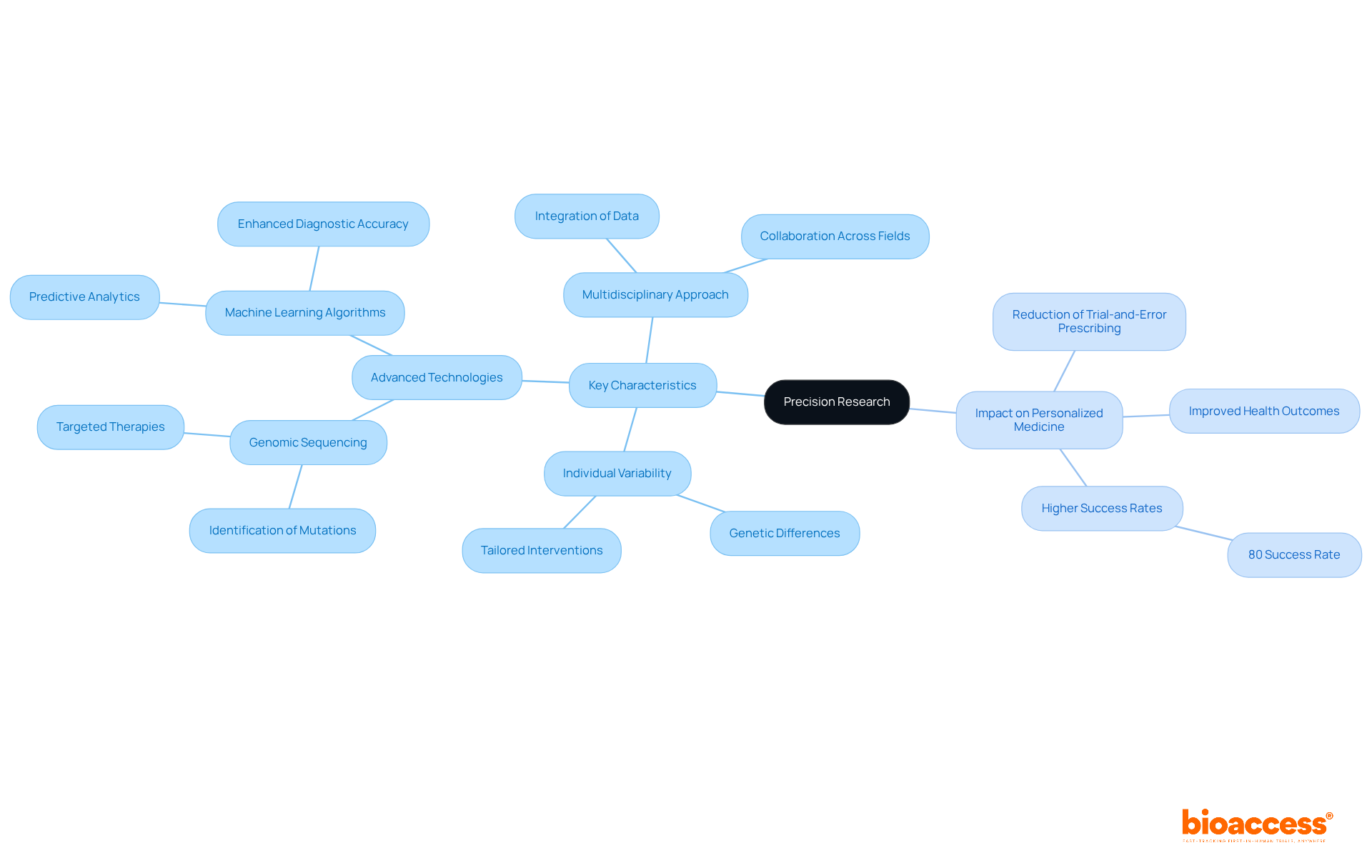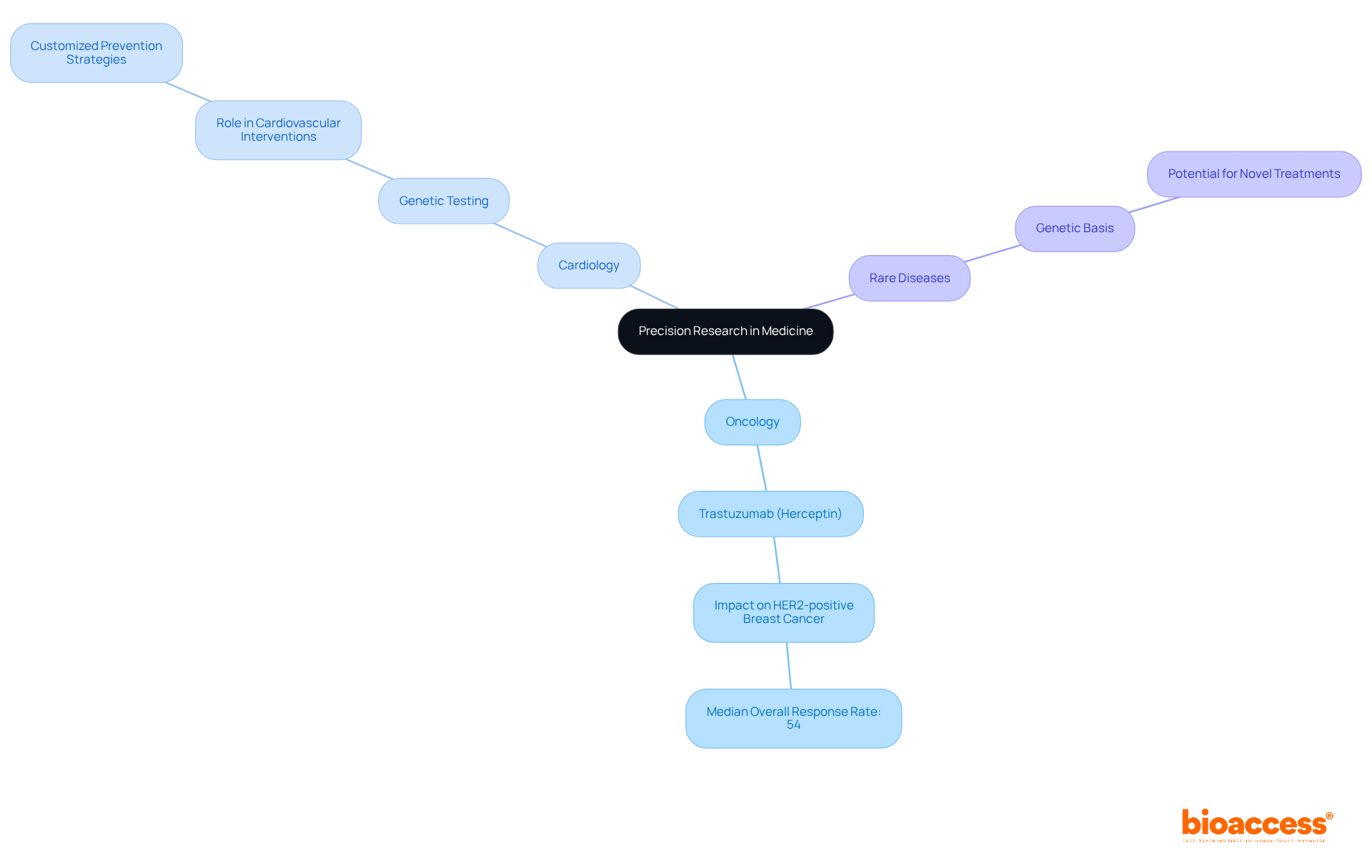


Precision research represents a tailored approach in medical investigation, focusing on the unique characteristics of individuals, including their genetic profiles and lifestyle choices. This methodology leads to more effective and personalized care, capturing the attention of the medical community.
The article underscores its critical importance by illustrating how precision research enhances treatment outcomes through targeted therapies, such as HER2-targeted treatments in oncology. However, it also addresses significant challenges, including the high costs and ethical concerns associated with genetic testing.
This dual perspective reinforces the necessity for continued dialogue and innovation in the field.
Precision research is revolutionizing the field of medicine by emphasizing the distinct characteristics of individuals, encompassing everything from genetic profiles to environmental influences. This customized approach not only aims to improve treatment efficacy but also seeks to reduce adverse effects, ultimately enhancing patient satisfaction.
Nevertheless, as this discipline advances, it encounters substantial challenges, including high costs and ethical dilemmas. This raises a critical question: can precision research genuinely fulfill its transformative promise in healthcare, or will these hurdles obstruct its broader implementation?
Precision inquiry embodies a customized approach in medical investigation, concentrating on the unique characteristics of individuals, including their genetic profiles, environmental influences, and lifestyle choices. This methodology is crucial in developing tailored care plans that surpass the effectiveness of conventional one-size-fits-all approaches. The significance of accurate research in medicine is underscored by its capacity to improve outcomes for individuals through therapies specifically designed to meet personal requirements. This targeted method not only enhances the efficacy of interventions but also reduces adverse effects, leading to improved safety and satisfaction for patients.
For instance, advancements in targeted medicine have demonstrated remarkable success in oncology, particularly with HER2-targeted treatments that have significantly improved outcomes for breast cancer patients with HER2-positive tumors. Furthermore, the integration of statistical analysis in fields such as neurology has facilitated the early detection of conditions like Alzheimer's disease, greatly enhancing management strategies. As healthcare continues to evolve, the role of precision research becomes increasingly vital in developing effective therapies and enhancing overall healthcare delivery.
However, challenges such as substantial upfront costs for genetic testing and ethical considerations regarding individual data must be addressed to fully unlock the potential of targeted medicine. With global personalized medicine expenditure approaching $32 billion in 2022, the investment in this area highlights its growing importance. As specialists assert, 'AI is essential for unlocking personalized medicine, customizing therapies for individual patients,' emphasizing the transformative potential of precision research in contemporary healthcare.

The development of accurate research can be traced back to the completion of the Human Genome Project in 2003, which provided a comprehensive map of human DNA and identified approximately 20,500 genes within the human genome. This monumental achievement laid the groundwork for understanding genetic variations and their implications for health and disease. Over the years, advancements in genomics, bioinformatics, and data analytics have propelled the field, enabling researchers to analyze vast datasets and identify patterns that inform personalized treatment strategies.
Notably, studies like TARGET and I-PREDICT have demonstrated high actionability rates in identifying matched therapies, showcasing the potential of genomic data in clinical applications. The incorporation of personalized medicine into clinical practice has gained momentum, particularly in oncology, where targeted therapies based on genetic profiling have shown significant success. The worldwide exact oncology market was valued at USD 81.37 billion in 2022 and is expected to reach approximately USD 254 billion by 2032, expanding at a CAGR of 12.1% from 2022 to 2032. This growth indicates the rising acknowledgment of the advantages of targeted medicine, including enhanced disease prevention and personalized care alternatives.
As technology progresses, precision research is anticipated to broaden its scope across multiple medical fields, improving the capability to customize therapies to unique individual profiles. The continuous partnership among researchers, healthcare practitioners, and pharmaceutical firms is essential for converting genomic discoveries into practical treatments, ultimately altering care and outcomes for individuals.

Precision research is at the forefront of modern medicine, focusing on individual variability, advanced technologies, and a multidisciplinary approach. Central to this endeavor are key methodologies such as genomic sequencing, which enables the identification of specific mutations within an individual's DNA—mutations that can significantly influence therapeutic responses.
Extensive studies have demonstrated that precision research in genomic profiling leads to targeted therapies, enhancing outcomes by tailoring interventions to genetic profiles. Indeed, precision medicine has achieved an impressive 80% success rate across various health outcomes, underscoring its effectiveness.
Moreover, the integration of machine learning algorithms in analyzing complex datasets has proven invaluable. These algorithms adeptly identify subgroups of individuals likely to benefit from specific therapies, thereby enhancing diagnostic accuracy and facilitating the development of personalized care plans.
This innovative approach streamlines the clinical decision-making process and aligns treatment strategies with the unique needs of each patient, ultimately resulting in improved health outcomes.

The practical applications of precise studies are increasingly evident across diverse medical fields. In oncology, targeted research has led to the development of therapies that specifically address genetic alterations in individual tumors. For instance, trastuzumab (Herceptin) has revolutionized treatment for HER2-positive breast cancer, significantly improving outcomes for patients, with studies indicating a median overall response rate of 54% for genome-informed therapies.
Similarly, in cardiology, interventions are customized through precision research based on genetic predispositions to heart disease, facilitating more effective prevention strategies. A notable example is the use of genetic testing to identify individuals who may benefit from specific cardiovascular interventions, thereby enhancing the management of heart conditions.
As noted by Vinay Prasad, MD, MPH, while the pool of patients eligible for genome-driven therapies has expanded, these interventions have only reached a minority of individuals with advanced cancer. Furthermore, precise studies are making strides in rare diseases, where understanding the genetic basis of conditions can lead to the development of novel treatments.
These applications highlight the transformative potential of precision research in enhancing patient care and advancing medical knowledge, paving the way for more personalized and effective treatment options.

Precision research signifies a transformative shift in medical investigation, prioritizing the unique traits of individuals to develop tailored healthcare solutions. By moving away from traditional one-size-fits-all methodologies, this approach not only enhances treatment efficacy but also significantly improves patient safety and satisfaction. The emphasis on personalized care is essential for addressing the diverse needs of patients and ensuring that medical interventions are as effective as possible.
Throughout this article, key aspects of precision research have been explored, including its:
The completion of the Human Genome Project marked a pivotal moment, enabling deeper insights into genetic variations and their implications for health. The successful integration of precision medicine in fields like oncology and cardiology has been highlighted, showcasing how targeted therapies can lead to improved outcomes for patients. Furthermore, the methodologies employed in precision research, such as genomic sequencing and machine learning, are critical in identifying and developing effective treatment strategies tailored to individual profiles.
The impact of precision research on healthcare is profound, offering the promise of more effective and personalized medical care. As advancements continue to unfold, it is crucial for stakeholders in the healthcare sector to embrace and invest in precision medicine. By fostering collaboration among researchers, practitioners, and pharmaceutical companies, the potential of precision research can be fully realized, ultimately leading to better patient outcomes and a more efficient healthcare system. The future of medicine lies in understanding and addressing individual needs, and precision research stands at the forefront of this evolution.
What is precision research in medicine?
Precision research is a customized approach in medical investigation that focuses on the unique characteristics of individuals, including their genetic profiles, environmental influences, and lifestyle choices.
Why is precision research important in medicine?
Precision research is important because it helps in developing tailored care plans that improve patient outcomes by providing therapies specifically designed to meet individual needs, enhancing efficacy, and reducing adverse effects.
Can you provide an example of precision research in action?
An example of precision research is the use of HER2-targeted treatments in oncology, which have significantly improved outcomes for breast cancer patients with HER2-positive tumors.
How does precision research impact early disease detection?
Precision research, particularly through the integration of statistical analysis, has facilitated early detection of conditions like Alzheimer's disease, which enhances management strategies for such conditions.
What challenges does precision research face?
Challenges include substantial upfront costs for genetic testing and ethical considerations regarding individual data, which need to be addressed to fully realize the potential of targeted medicine.
What is the financial outlook for personalized medicine?
The global expenditure on personalized medicine approached $32 billion in 2022, indicating its growing importance in healthcare.
How does AI contribute to precision research?
AI is essential for unlocking personalized medicine by customizing therapies for individual patients, highlighting the transformative potential of precision research in contemporary healthcare.